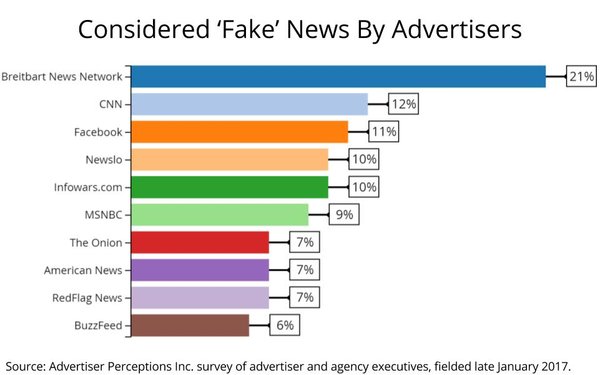Nearly Half Of Ad Execs Don't Know Or Care About Using 'Fake News,' Big Brands Most Prone
- by Joe Mandese @mp_joemandese, April 4, 2017

Nearly half of ad executives surveyed recently
about their advertising plans for “fake news” said they either don’t care or do not know what it is. Remarkably, the survey, conducted by Advertiser Perceptions Inc. among
advertisers and agency executives, found that 7% willfully plan to advertise in -- and 8% said they don’t care either way about -- advertising media outlets they deem to be publishers of
“fake” news content.
Nearly a third (29%) said they aren’t clear whether their ads run on fake news outlets or not.
Slightly more than half (56%) of ad executives said they actively avoid advertising on publishers they consider to be fake news outlets.
The survey found that avoidance of fake news outlets rises with the seniority of the ad executive surveyed, but that bigger-budget advertisers are more prone to use them.
advertisement
advertisement
By category, technology, consumer electronics and financial services marketers said they are most apt to avoid fake news outlets, while consumer packaged goods marketers were least sensitive to advertising in the genre.
The confusion and disposition of ad executives surveyed may have something to do with which news outlets they consider to be “fake.” Asked to list outlets that they deem disseminators of fake news, alt right news publisher Breitbart generated the highest response, with 21% of respondents citing it as “fake news” -- but remarkably, CNN ranked No. 2 with 11% of ad executives deeming it "fake news."
With the exception of CNN and BuzzFeed, none of the major news outlets called “fake news” by President Donald J. Trump made the list, including The New York Times and The Washington Post.Editor’s note: After this article was published Advertiser Perceptions qualified the findings of the fake news outlets findings, noting that it was fielded as an “open-ended” question and that more than half of marketers did not respond to it.
“A very small number of marketers identified a few popular names like Breitbart, Infowars and The Onion,” a spokesman said, adding, “Surprisingly, even a few mainstream names came up, but the actual number of marketers who listed these media brands and companies was very small.”



The NYT and the WashPost certainly belong on the "Fake News" list, their political "reporting" is so biased and misleading that they could easily be accused of creating false news narratives.
Disgrace cannot begin to describe them. May they all find their future jobs at Walmart with split schedules.
This all started back in 1996 when the senior execs at the agencies and clients abdicated their responsbility because they had no clue what digital advertising was all about... and baby look at us now....
Joe, I know I am a broken record.....but......Not a bad idea to always inform the reader of how the sample was "recruited," the sample size, the dates of interviewing, and the actual questions asked, when reporting on a "research" study. What's the harm in that? In the old days, we used to call these the "CASRO Guidelines" that all reputable research firms provided freely to journalists.
Joe, I think that Marshall is right---especially about how the sample was defined and contacted as a clue to whether it was representative---many are not.
@Marshall & Ed: I don’t disagree that it is best practice to provide readers with methodology and sample information when reporting on survey-based research. We always try to do that. In this case, this was all the information we could get from the source of the research and we made a decision that it was still worth publishing. News reporting is not an exact science and we are constantly making judgement calls about the veracity of sources and the information they share and how to contextualize it for readers. I’m sorry if we let you down in this case. But you can get too extreme about it too. When I worked at Ad Age in the early 1990s, they had a requirement that every story about statistical research had to have the margin of error in it. For a guy who wrote regularly about TV ratings, it got a little obnoxious for me -- and I think for many readers. I'll try to do a better job in the future.
Joe, my friend, you do a much better job than most and we researchers appreciate it. It is bizarre, however, to read about a survey regarding "fake news" and then to not know anything about the research that led to those conclusions. And I know you "try" to get research companies to offer up their methodology. But when it is not so wonderful, they don't realy want to reveal it. And I understand your reluctance to pounce on them.
As I used to say....Do not teach a pig to sing. It's a waste of your time and it annoys the pig.
Oh well. Onward.